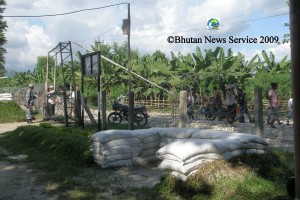A village within a camp
This is not a wonder, as you feel when reading this, but the fact is a village has been created within the Bhutanese refugee camp in Nepal. And it is named as security village.
Created on the lap of Armed Police Force base camp in Beldangi I, the security village turns to be a shelter for all refugees getting threats for opting to go third country as part of the resettlement.
The village contains only few huts where people recommended by the UNHCR, having felt the need to provide security due to increasing threats, are sheltered in. Attached is four-hut separate shelter called transit huts.
The first to enter this security village is Thug Bahadur Thapa of Beldangi I who has recently received death threats. Thapa shifted to the village in November last week along with his seven-member family. The Bhutanese refugee camps in recent years have turned to be the heartland of warning, threats and killing of public figures.
Those kept in transit huts say, they would be soon pushed up for resettlement while those in security village have to wait for some longer time before UNHCR forwards the case to resettling countries. Currently, Tashi Sherpa, T. B. Poudel and Subash Acharya have been camped in transit huts.
Acharya says, this a jail life. No one is allowed to enter the village without permission and registering an entry is only through APF personnel. Conversely, those sheltered in the security village and transit huts are not allowed to go out without security escort. The world for them is the distance they could see through their huts and visiting relatives has been limited through phones. APF personnel provide security vigilance for 24-hours around.
Neither the APF, refugee coordinating units and local administration in Jhapa can decide who lives here. The sole authority rests on UNHCR to identify the family in threats and require security at most.
Few days after K. B. Khadka’s murder, Acharya also made a narrow escape to similar attempt. The only alternative to the Acharya was to accept this jail-like life. Confinement is better than death.
Threats are unending. Acharya’s other family members in Beldangi II Extension have become target after his shift. Mental torture to mother has heightened. Even the RCU officer has received threats for sheltering him on transit hut. He has received warning to remove him from the transit.
Poudel of Beldangi II Sector G/2, 46, who has been sheltered in transit huts along with his family since November 25, says he still loves to get repatriated to homeland but situation compelled him to opt for resettlement to third country at the earliest possible. His children stopped attending school due to the possibility of being kidnapped.
Sub inspector of APF Gunaraj Baniya said crime rates are in decreasing trend but threatening has increased in camps. Can the UNHCR and police provide similar veil to all families inside security villages if threats continue to rise in the camps? Baniya says no and adds, we are providing security to all in the camps.
The resettlement has already brought separation of the society that remained tight together for years. The security village and transit huts added sours to hearts that are separating but compulsion rests above all. As felt by Beldangi I camp secretary T. B. Gurung, separation from society on the eve we are departing to unknown destinations would be as bad as we left our homes and properties back in the country during eviction.
S.B. Nambang says people need to respect the individual rights and Bhimlal Dhamala stresses that people need to know the reason why they targeted by armed groups while seeking solution.

